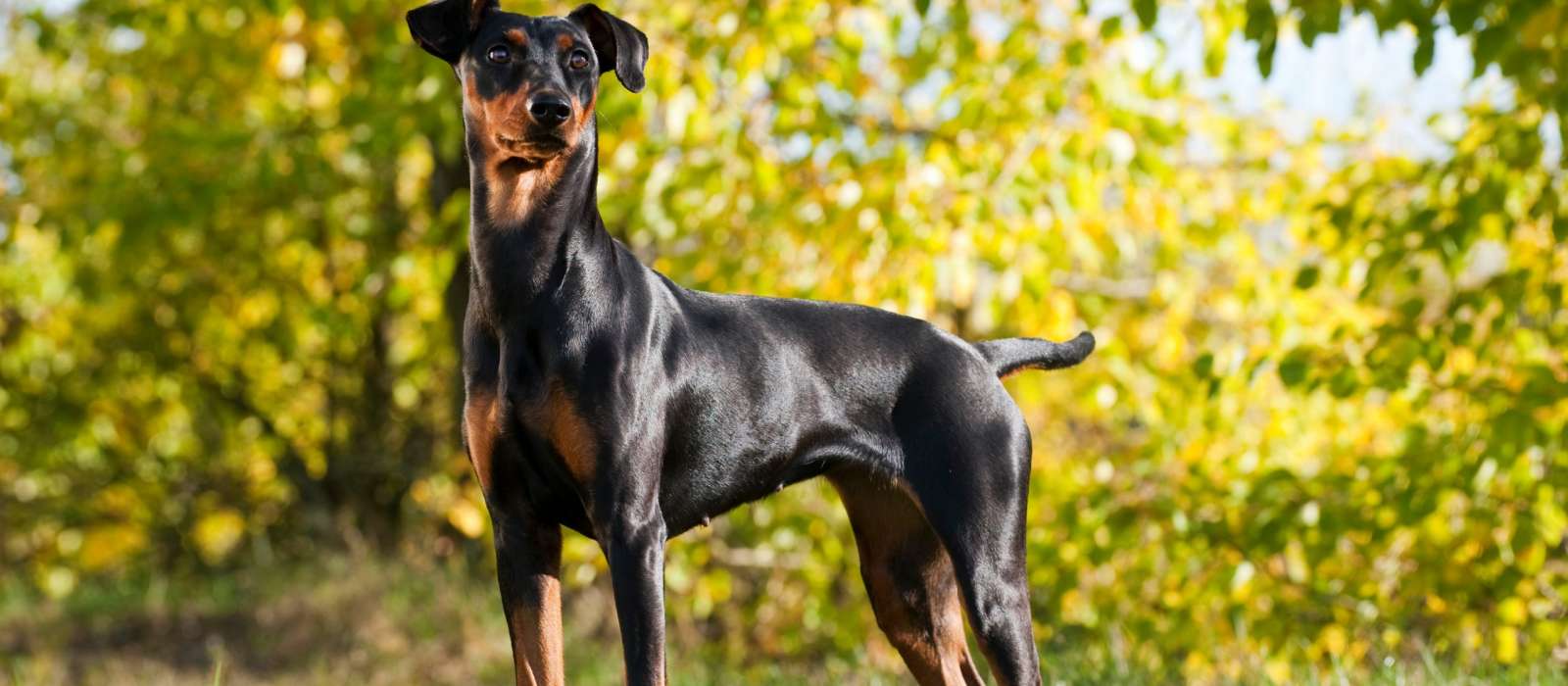-
Activity Level:
high
-
Shedding Level:
low
-
Grooming Level:
low
-
Trainability:
moderate
-
Good for Novice Owners:
moderate
-
Adaptability:
moderate
-
Kid/Pet Friendly:
sometimes
-
Prey Drive:
high
-
Watchdog:
very alert
- Average Size: Medium
- Average Lifespan: 12-14 years
- Registered?: aca, akc, other
German Pinscher Dog Breed Information
Overview
Temperament
Adaptability
Health
Owner Experience
Grooming
Activity Level
Size
Life Span
Did You Know?
The German Pinscher (GP) originated in Germany. Drawings featuring them have been dated back to 1780, and their roots can potentially be traced as far back as the 15th century. They are considered one of Germany’s oldest dog breeds and were used as a blueprint for developing other pinscher breeds and other German breeds.
One of the facts about German Pinschers is that they were the original Pinscher breed. They were originally bred to be rat-catchers and often also multitasked as a vigilant watchdog. The GP’s sleek body, endurance, and intelligence made them excellent at pest control, but also meant they could be trained for a variety of work.
Although there have been accounts of individual German Pinschers coming to the United States earlier, they started to become popular with U.S.-based breeders in the early 1980s. The American Kennel Club recognized the German Pinscher in 2003 as a member of the Working Group.
German Pinschers are loyal and devoted dogs that are affectionate with their families. Well-socialized, they tend to be good-natured with an even temperament. They also have a playful personality that extends into adulthood.
Although they tend to get along well children, their strong, assertive personalities tend to make them a better fit for older children. They also have a high prey drive, so they will need a lot of extra socialization with any small pets in the household. German Pinschers are also alert watchdogs. They are naturally suspicious of strangers and will bark to alert you. Socializing your dog early and often and training your dog to stop barking can help keep this to alert barking and avoid excessive barking.
Because they have a protective instinct, proper socialization and training are even more important for your German Pinscher puppy to grow into a well-balanced, well-mannered dog. Meeting the mother in person can give you a good idea of the temperament and manners she is modeling for her puppies. But, once you get them home, it is up to you to continue training and socializing a puppy.
A German Pinscher is a moderately adaptable dog breed. Because of their high energy levels, they are a better fit for homes with fenced yards where they can run. They can adapt to apartment living, but you will need to dedicate a lot of time every day to making sure they get the exercise and mental stimulation they need.
They tend to do well in most climates. As with any dog breed, they are sensitive to heat. Also, because of their short coat, they may need to gear up with some winter dog products to stay warm on walks when the temperatures drop. Because they bond closely with their families, they also do not like to be left alone for long periods of time.
A German Pinscher has an instinctual urge to chase and a high prey drive. As such, they should only be let off-leash in securely fenced areas. Even the most well-trained German Pinschers may decide to ignore recall commands in favor of chasing something more interesting.
Although this is a relatively healthy dog breed, there are some potential conditions to be aware of. In the German Pinscher, these can include von Willebrand’s disease, eye disease, heart problems, and hip dysplasia.
Reputable breeders will be screening their dogs to make sure they are not passing issues to puppies. So, don’t be afraid to ask about the health and genetic history of both parents. You can also ask to see relevant health clearances and test results. The German Pinscher Club of America recommends a cardiac exam, a DNA test for von Willebrand Disease (VWDI), a hip evaluation, and an ophthalmologist evaluation.
Although a German Pinscher is highly intelligent and will pick up on things easily, they are willful, mischievous, and can be stubborn. They tend to be a better fit for more experienced owners who can handle their high energy, working dog nature, curious personality, and tendency to push boundaries.
Because socialization and training are important to any dog breed, and especially to this one, puppy training and obedience classes are encouraged. Even if you are an experienced owner, these classes can be a great way to provide additional reinforcement while also getting some socialization opportunities. These are some key benefits of puppy training classes.
A German Pinscher has a sleek, short, and dense coat that will shed a little year-round. Weekly brushing and the occasional bath, as needed, are all this dog’s coat needs to stay healthy and looking great.
In addition to coat care, you will also need to care for your German Pinscher’s nails, ears, and teeth. Cutting your dog’s nails once or twice a month, depending on how quickly they grow, keeps them from getting too long and causing issues.
Weekly ear checks and carefully cleaning your dog’s ears as needed can help prevent ear infections. Brushing teeth or using an enzyme toothpaste every day is ideal dental care for dogs, in addition to cleanings at the vet when needed, and helps prevent painful dental diseases later in life.
German Pinschers are high-energy working dogs. They need a lot of daily activity, mental stimulation, and a job to do to be happy and healthy. Daily walks plus time to run, playtime, and other activities can be enough for this dog, but they will likely be up for more activity if you offer it to them.
They will love any opportunity to spend time being active with you. Thankfully, they are versatile and athletic dogs, so you can jump into a wide variety of activities once puppies finish growing and developing. In addition to standard activities like running, swimming, frisbee, hiking, etc., they are also great candidates for dog sports, like agility, obedience, tracking, rally, and more.
Fully-grown German Pinschers usually stand 17-20 inches tall and weigh 25-45 pounds.
German Pinschers generally live for 12-14 years on average.
You can find the German Pinscher in the origin stories of several dog breeds, including Rottweilers, Dobermans, and Miniature Pinschers, as well as Mini, Standard, and Giant Schnauzers.






